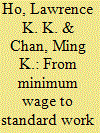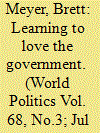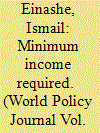|
|
|
Sort Order |
|
|
|
Items / Page
|
|
|
|
|
|
|
| Srl | Item |
| 1 |
ID:
124246


|
|
|
|
|
| Publication |
2013.
|
| Summary/Abstract |
This paper aims to highlight the significance of labour issues - namely, the minimum wage (MW) and standard working hours (SWH) - in shaping candidates' electoral platforms in the 2012 chief executive (CE) election of the Hong Kong Special Administrative Region (HKSAR) under the sovereignty of the People's Republic of China (PRC). We first offer a brief review of labour politics regarding the MW case as a precursor to the SWH drafting and enactment process. We then provide an analytical delineation of some of the labour and socio-economic dimensions of the CE electoral contest by comparing the candidates' campaign planks in relation to SWH. We then attempt to predict the likely course of the SWH debate under the leadership of Leung Chun-ying, who eventually won the CE election and assumed power on 1 July 2012. We conclude by examining Leung's social engineering attempts to increase popular support amongst low- and middle-income (LMI) households as part of his long-term strategy for the 2017 CE elections and his broader Beijing-entrusted political agenda.
|
|
|
|
|
|
|
|
|
|
|
|
|
|
|
|
| 2 |
ID:
146058


|
|
|
|
|
| Summary/Abstract |
One counterintuitive variation in wage-setting regulation is that countries with the highest labor standards and strongest labor movements are among the least likely to set a statutory minimum wage. This, the author argues, is due largely to trade union opposition. Trade unions oppose the minimum wage when they face minimal low-wage competition, which is affected by the political institutions regulating industrial action, collective agreements, and employment, as well as by the skill and wage levels of their members. When political institutions effectively regulate low-wage competition, unions oppose the minimum wage. When political institutions are less favorable toward unions, there may be a cleavage between high- and low-wage unions in their minimum wage preferences. The argument is illustrated with case studies of the UK, Germany, and Sweden. The author demonstrates how the regulation of low-wage competition affects unions’ minimum wage preferences by exploiting the following labor market institutional shocks: the Conservatives’ labor law reforms in the UK, the Hartz labor market reforms in Germany, and the European Court of Justice's Laval ruling in Sweden. The importance of union preferences for minimum wage adoption is also shown by how trade union confederation preferences influenced the position of the Labour Party in the UK and the Social Democratic Party in Germany.
|
|
|
|
|
|
|
|
|
|
|
|
|
|
|
|
| 3 |
ID:
155542


|
|
|
|
|
| Summary/Abstract |
Britain’s “minimum income requirement” restricts citizens and legal residents who earn less than £18,600 ($24,000) from bringing their spouses from outside Europe to live with them. Journalist Ismail Einashe looks at the consequences of this threshold, advanced by now-Prime Minister Theresa May when she was home secretary, on parents and children. Einashe describes how the 2012 law has created thousands of “Skype families” who go years without seeing one another, and how its opponents warn it will lead to a brain drain from the United Kingdom.
|
|
|
|
|
|
|
|
|
|
|
|
|
|
|
|
| 4 |
ID:
086614


|
|
|
|
|
| Publication |
2009.
|
| Summary/Abstract |
Using data at micro and city levels, the present paper explores the policy evolution of the minimum wage system in China, and examines its coverage for migrant workers. The analysis indicates that minimum wage policy has been substantially improved in terms of both coverage and the level of the minimum wage standard, but that the current policy tool that relies on the monthly wage rate is not effective. Because migrant workers tend to work more hours, use of an hourly wage rate is more appropriate than a monthly wage rate.
|
|
|
|
|
|
|
|
|
|
|
|
|
|
|
|
| 5 |
ID:
146638


|
|
|
|
|
| Summary/Abstract |
In the spring of 2010, the strike of the Honda workers in Nanhai instigated an on-going discourse on the “rights awakening” of the “new generation of migrant workers.” Since then, much has been written about these young workers, generally described as more pro-active and ready to stand up against their employers than the older and more subservient generation. Drawing from statistical findings from two factory-gate surveys in the metal mechanics and garment sectors in Shenzhen, this paper tests two hypotheses: (a) that workers of the younger generation are more cognizant of their legal rights than older workers; (b) that the younger generation wants to work fewer hours and to enjoy life more. We argue that this popular image of the younger generation of migrant workers is one-dimensional and reductive, as it focuses only on generational differences as an explanatory factor for worker activism, while ignoring other issues such as types of industries and payment systems. In this paper, we purport that these elements play important roles in shaping the attitude of this younger generation toward their work and rights.
|
|
|
|
|
|
|
|
|
|
|
|
|
|
|
|
| 6 |
ID:
157424


|
|
|
|
|
| Summary/Abstract |
It has been more than eight years since many of the United States’ cashiers, dishwashers, janitors, lifeguards, baggage handlers, baristas, manicurists, retail employees, housekeepers, construction laborers, home health aides, security guards, and other minimum-wage workers last got a raise. The federal minimum wage now stands at just $7.25. In real terms, these workers’ earnings have declined by nearly 13 percent since the last hike, in 2009—and have fallen by over one-third since 1968, when the real federal minimum wage was at its peak of $11.38 in today’s money (although only $1.60 then). Although most Americans think the minimum wage should go up—one 2017 poll found that 75 percent supported raising it to $9.00 per hour—today’s Republican-controlled Congress is unlikely to act.
|
|
|
|
|
|
|
|
|
|
|
|
|
|
|
|
|
|
|
|
|